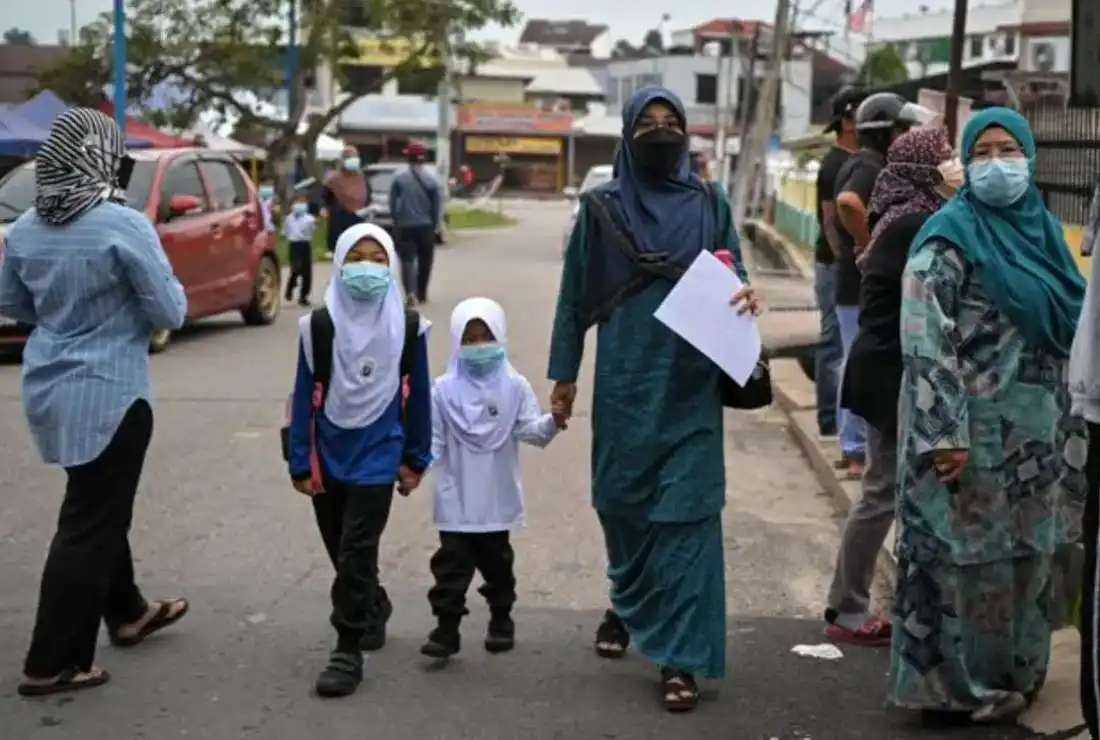
A mother arrives with her daughters on the first day of elementary school in Karak, Pahang state on March 21, 2022. Muslim-majority Malaysia's children were seen getting involved in different kinds of pro-Palestinian protests during the Palestine Solidarity Week from Oct 29. to Nov. 3. (Photo: AFP / UCAN files)
Malaysians entered 2023 with the great hope that the seven-week-old Anwar Ibrahim government would fulfill its election promises of lifting the country’s sagging economy, arresting corruption, and bringing about institutional reforms that previous governments promised but failed to deliver.
There were also sections of both Muslims and non-Muslims that wanted the civil and political rights of all citizens to be respected and for Islamization to not seep further into policies and institutions.
They probably forgot that Ibrahim was a protégé in 1982 of then prime minister and Umno president Mahathir Mohamad and was tasked to deliver the ruling party’s newly formulated Islamization policy. He ensured then that various aspects of life were Islamised and that included educational institutions, government agencies, and financial institutions.
Even if Malaysians had not forgotten, they probably thought that Anwar had changed.
He had, after all, worked closely with the Chinese-based Democratic Action Party for the last 24 years in his struggle to return to power, and received the lion’s share of the non-Muslim votes in the last general election.
All that now seems like a long time ago. The country has got closer to institutionalized Islamization under Ibrahim’s watch.
He is the first prime minister to give the Islamic Development Department (known by its Malay acronym Jakim) a role in formulating national policies and working towards harmonizing civil and Sharia laws.
His government is also pushing for an amendment to the Federal Constitution known as Bill 355 to raise the Sharia Courts’ maximum sentencing limits. The bill was tabled three times by the Islamist party PAS when it was in the opposition — twice in 2016 and once in 2017 — but all three times, it did not go on to the debate stage.
Although this bill is said to only affect Muslims, non-Muslims are skeptical. The duality in the Malaysian legal system where both Sharia and civil laws co-exist has seen conflicts between the two sets of laws and in some cases the rulings. There are numerous high-profile cases of conversion and marriages involving both Muslims and non-Muslims which are far from over.
Former Bar President Ambiga Sreenevasan, one of those opposing Bill 355, said in 2017, "If you look at the conversion cases that have taken place. When it plays out it does impinge, and those cases go unsolved for many, many years.”
The other reason is that “Bill 355 will be resurrected along with 11 other bills, one of which appears to seek to control and restrict the propagation of non-Muslim religions,” according to academic Ahmad Fauzi Abdul Hamid.
Some see the bill as a facade for the eventual entry of hudud laws (a strict Islamic penal code) into the country, observed Singapore-based analyst Rashaad Ali.
There was also general uneasiness when the government announced plans to include Imam Al-Nawawi’s 40 Hadith appreciation module in the school curriculum for Muslim students. The introduction of the compilation of the sayings of Prophet Muhammad was done upon Ibrahim’s recommendation.
Civil and religious groups opposed the move, fearing this could start the proselytization of children in schools.
Schools were also dragged into the religious and geopolitical conflict involving Israel when the government introduced the Palestinian Solidarity Week at the end of October. It caused an outcry from non-Muslim and liberal Muslim groups with one activist asking, “Are we training jihadis now in our schools?”
Then there was the seizing of LGBT-themed Swatch watches, the cancellation of a rock concert, and Ibrahim’s over-the-top support for Hamas — all of which may impact investors’ confidence.
Those in Sabah and Sarawak were uneasy over recent Islamist initiatives and have been selective in their adherence to federal government directives.
Both governments refused to allow public schools in the two Bornean states to observe the Palestinian Solidarity Week. Sarawak will also not allow any hadith teaching in its schools.
Both states also said they would not be accepting Palestinian refugees should the federal government decide to. The state governments said they needed to prioritize their people over the refugees in resource management.
Sabah is the poorest state in Malaysia, while Sarawak is the third poorest.
The refusal by the Sarawak TV station to include a Christmas carol in a Christmas program received a huge backlash from both Sarawakians and Sabahans.
The Association of Churches in Sarawak made a bold move. It said it would boycott the event when organizers refused to replace Jingle Bell Rock with a more appropriate O Holy Night to mark the birth of Jesus Christ.
It seems there was a ban on non-Islamic religious elements on broadcast media which was not known to many. The Sarawak premier, a Muslim, then intervened and the TV station made a U-turn.
Thus, 2023 concludes with a lingering fear that there will be more attempts to erode civil and religious rights in the future, though Sabah and Sarawak have shown the rest of the country that a concerted and unified effort can place checks on such moves.
*The views expressed in this article are those of the author and do not necessarily reflect the official editorial position of UCA News.


